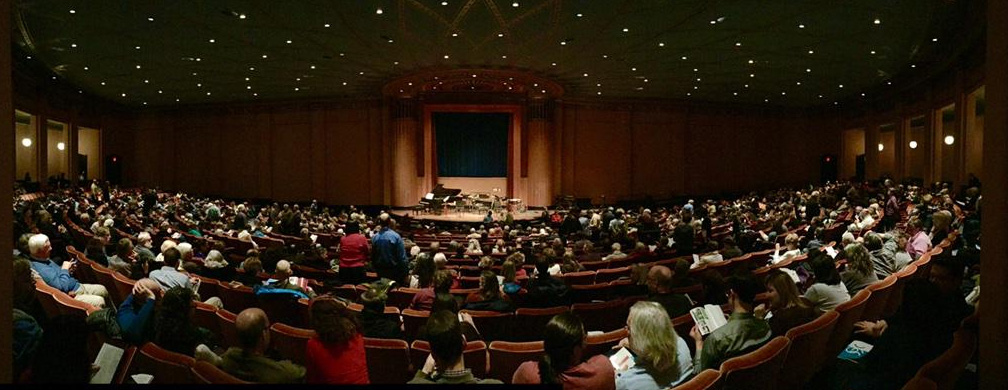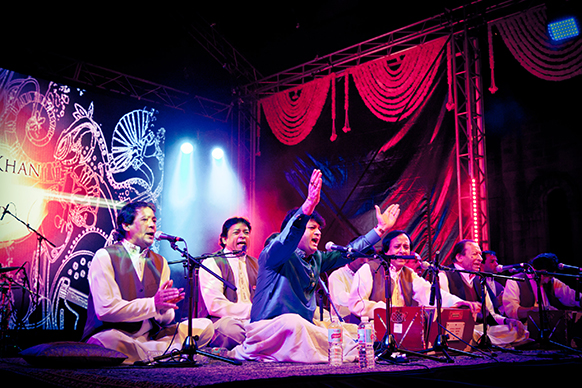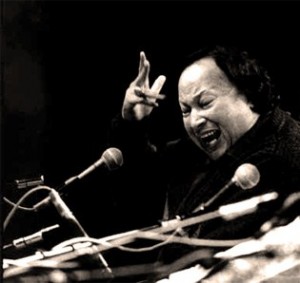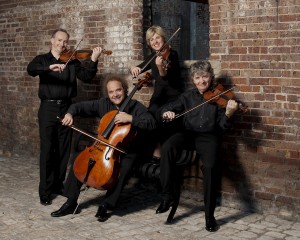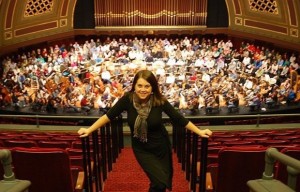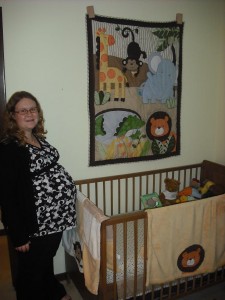What is a Basset Horn?
Kari Dion is Programs Assistant at the Ann Arbor Summer Festival and clarinetist for the Akropolis Reed Quintet. Wind players of the Chicago Symphony come together for this special concert that features two of Mozart’s compositions for wind ensemble. See Chicago Symphony Winds perform Sunday, March, 22.
Jennifer Koh performs 2/6
Ken Fischer tells us about Jennifer Koh’s upcoming performance in Ann Arbor. Interested in going to the concert? Get more info: http://bit.ly/1rp7IPd
eighth blackbird audience
An excited crowd waits for the eighth blackbird performance! Did you attend? Don’t forget to share your thoughts.
A Closer Look at Qawwali: Interview with Farina Mir
Photo: Asif Ali Khan Qawaali Music of Pakistan performs.
On Friday, March 21, 2014 at 8 pm, UMS presents Asif Ali Khan Qawwali Music of Pakistan in Rackham Auditorium. A protege of the late, legendary Nusrat Fateh Ali Khan (1948-97), Asif Ali Khan performs the beautiful tradition of qawwali music of Pakistan and India. Whether you’re an adherent of the Sufi faith or not, the aesthetic experience of qawwali music is unique, inspiring, and inclusive.
To hear more, we talked with Farina Mir, the Associate Professor of History and Director of the Center for South Asian Studies at the University of Michigan. She is also the author of The Social Space of Language: Vernacular Culture in British Colonial Punjab (University of California, 2010), and co-editor of Punjab Reconsidered: History, Culture, and Practice (Oxford University Press, 2012).
Farina was fortunate enough to hear Nusrat Fateh Ali Khan perform, and the experience changed the professional focus of her life.
UMS: Tell us about your experience seeing Nusrat Fateh Ali Khan.
Farina Mir: I heard Nusrat Fateh Ali Khan at a charity dinner in New York City when I was only a junior in college. At the time, I hadn’t heard of the artist and was totally unfamiliar with the art of qawwali. I had only just started studying South Asian history; though, it quickly became a passion. I was particularly drawn to the history of the partition of India in 1947, which had led to the creation of Pakistan. This was a cataclysmic event, in which at least 17 million people migrated across newly created international borders (the largest peace time-migration of the twentieth century) and as many as one million people died in mass civil violence between members of different religious communities. I was particularly troubled by the violence of partition. The history I had learned—the standard history of the event at the time—found the roots of partition in “communalism,” antagonism along religious lines. It was a history that led one to think of Hindus and Sikhs, on the one hand, and Muslims on the other, as mutually antagonistic communities. What I saw at the charity concert undermined for me the certitude of this historical argument.
Many Voices
The audience for this concert wasn’t large; a relatively small hotel ballroom with people sitting at tables of 8 or 10, so maybe 200-300 people. Most of those in attendance were South Asian Muslims, but there was at least one table of Sikhs and Hindus. They stood out from the rest of the crowd because some of the men wore turbans and had unshorn beards. What stood out less than their presence—I knew from my own experience of growing up in the South Asian diaspora that members of all religious communities from the subcontinent intermingle socially—was their repeated requests for Nusrat Fateh Ali Khan to sing the compositions of particular Sufi poets. Qawwali as a genre is Sufi mystical poetry set to music. How were non-Muslims so familiar with Muslim Sufi poets, I wondered? And not only were they familiar with the poets’ names, but with particular compositions. They were making requests by reciting lines of Punjabi verse. And when Nusrat acknowledged their requests, I was struck by the looks of rapture of everyone around me, Hindu, Muslim, and Sikh alike.
An Enlightening Discovery
I, too, was taken in by the performance, by the pure pleasure of it—Nusrat Fateh Ali Khan and the qawwali form are nothing if not immensely powerful and emotive. But I was also taken in by the context of the performance. It produced a dissonance for me. I was struck by how the history books I was reading all emphasized Hindu, Sikh, and Muslim difference, yet what I saw that evening was a shared experience that defied the expectations produced by those history books. I began to wonder if there were historical antecedents to what I experienced that night. This led me to consider the historical role of the Punjabi language and its literary texts, including those of Sufi poets I heard at that performance, as the site for shared experiences among Hindus, Muslims, and Sikhs. What was hinted at in my experience that evening—the meaning, power, and pleasure of texts shared by members of different religious communities—led me to pursue a PhD in South Asian history, and today I teach in the history department at U-M. My book, The Social Space of Language: Vernacular Culture in British Colonial Punjab, provides one set of answers to the questions that emerged for me that night, with and through Nusrat Fateh Ali Khan’s amazing performance.
UMS: What do you think audience members who aren’t of the Sufi faith or no little about Sufi music will get out of the performance?
FM: As my comments above have suggested, there is undoubtedly an aesthetic beauty and emotional power to qawwali as an art form. It’s a pleasure to experience, no matter what one’s religion, or if one has no religious disposition at all. For those who know that this is a form of music associated with Sufi devotionalism, I think it will expose them to an aspect of Islam and Muslim devotion that has played a very significant role in Muslim devotion in the subcontinent historically, and continues to do so to this day.
UMS: What do you think people should look out for in seeing Asif Ali Khan’s performance with UMS this season?
FM: One of the pleasures of live performances of qawwali (as with other genres of Indian vocal performance) is artist improvisation. The genre lends itself to vocal improvisation, all within the bounds of a rigorous tradition of ragas and beat. Although improvisation is caught on recordings of live performance, the ability to see it in creation, as a response to a given environment is something you just can’t get off a CD!
UMS: Can you suggest some musical selections from Nusrat Fateh Ali Khan that might give our readers an entry point into his music? What’s important to you or interesting about these selections?
This is a hard question because there are so many dimensions to Nusrat Fateh Ali Khan’s music. One, of course, is that of aesthetic pleasure; the joy of the music/composition. This is accessible to anyone. The other, is the content of the verses set to music. Nusrat performed compositions in Persian, Urdu, and Punjabi (among other languages). Each has an important place in his repertoire. Three stand out for me, one in each language:
Qawwali in Farsi by Hazrat Amir Khusro in Raga Khamaj. I am not fluent in Persian, so can’t speak to the content of the poetry being performed in this composition, but what I love about this qawwali is how it ties contemporary practice, in time and space, to the subcontinent and the reputed creator of the art form of qawwali. Amir Khusro is a thirteenth century poet who was a devotee of the Sufi saint Nizamuddin Auliya. Amir Khusro is buried in the shrine complex that emerged around the tomb of Nizamuddin Auliya in Delhi, and one can today visit his tomb, the shrine of his patron and Sufi master, and hear qawwali—usually poems in praise of the Sufi saint—in the precincts of his shrine. Khusro was a Sufi adept, as well as a gifted poet and music theorist. He is considered the father of Hindustani classical music, and it is through his own devotional practice that qawwali as a genre was born.
Main Jana Jogi de Naal. This is a Punjabi qawwali that draws on the poetry of the Sufi saint Bulleh Shah. The text is a Sufi poem that points to the hypocrisy of empty ritual, pointing to love (for the divine) as true faith. It’s an immensely evocative poem in its language and its allusions, and is performed with a level of emotion that conveys the conviction of the text, even if you aren’t a Punjabi speaker!
Modern qawwali by Allama Iqbal in Raga Bilawal. Allama Iqbal (Muhammad Iqbal) is among the most renowned Urdu poets of the twentieth century. This qawwali takes one his most famous poems, Shikwa (Complaint), and performs it in the genre of qawwali. Iqbal’s poem is a political tract about the place and status of Muslims in the early twentieth century, rendered as a complaint to God. It is a brilliant poem that captures an important moment in South Asian history. I like this qawwali not only for its beautiful verse, but for the ways it exemplifies how flexible and adaptable the qawwali genre is, particularly in the hands of someone as talented as Nusrat Fateh Ali Khan.
Did you listen to Farina’s music selections? Were you familiar with qawwali before? What do you think?
UMS brings Asif Ali Khan to Ann Arbor in conjunction with UMMA’s exhibition of Doris Duke’s Shangri La: Architecture, Landscape, and Islamic Art on view January 25 – May 4, 2014. Learn more about the exhibition.
Fantastic people and their kazoos say cheese
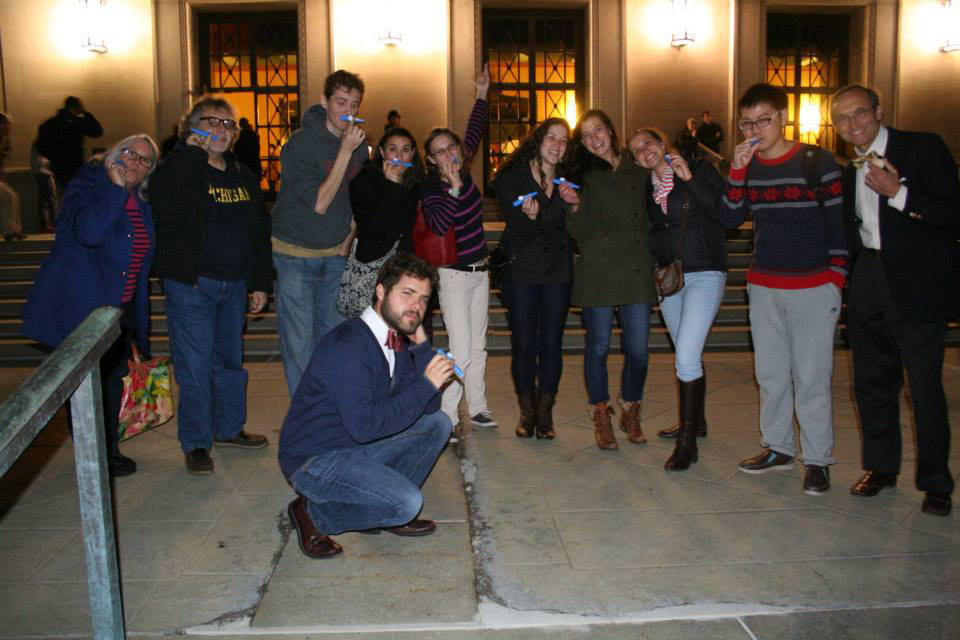
The UMS Kazoo Orchestra got together last Friday for a pop up performance before Chris Thile’s concert at Rackham Auditorium. Interested in trying out a kazoo yourself? Meet us at Ann Arbor Nerd Nite on Thursday, October 24 for a spooky kazoo cover of “Thriller.”
Letters from Artists: David Finckel, for the Emerson String Quartet
 All one has to do for the Emerson String Quartet is mention “Ann Arbor,” and vivid images arise, as we have been playing regularly for the University Musical Society since our earliest days. To a large extent, the places to which we have returned many times during our career are part of who and what we are.
All one has to do for the Emerson String Quartet is mention “Ann Arbor,” and vivid images arise, as we have been playing regularly for the University Musical Society since our earliest days. To a large extent, the places to which we have returned many times during our career are part of who and what we are.
From the Detroit Airport to the stage of Rackham Auditorium is a route as familiar as from my living to dining room: lunch at my favorite Lebanese restaurant near the airport; I-94 to the Ann Arbor exit; squeezing in the little tunnel under the hall; parking in the restricted space; the long tunnel to the double-sided green room, where tables are laden with photos to sign and the always-mind-blowing UMS season brochures; the little bells that count down to the concert; ascending the slightly-treacherous staircase to the left; squeezing through the small stage entrance while a stage attendant opens and disappears behind the door; and finally, the familiar warm welcome and intense listening of the discriminating and devoted UMS audience, ready to hear even our most challenging programs, and always rewarding us with hearty thanks.
The equally important part of the Ann Arbor experience is, of course, encountering director Ken Fischer, who seems ever more youthful in years and inspired in vision. To be a part of what UMS creates in Ann Arbor is, for us, to be part of something vastly larger than ourselves, which is seen around the country as an incomparable model of presenting and community service. With its strong and clear mission, UMS should be around for a good long time, here to serve the children and grandchildren of the vibrant Ann Arbor community. We wish Ken and his always-stellar team as much success as they can imagine, and more.
 David Finckel is the cellist for the Emerson String Quartet.
David Finckel is the cellist for the Emerson String Quartet.
UMS Staff Picks: Takács Quartet selected by Liz Stover, Programming Coordinator
SN: The Takács Quartet has been treating UMS audiences to exceptional performances of chamber works for many years, but in the 10/11 season, there will be not one, but three very special opportunities to hear this quartet as they perform their Schubert Project cycle of concerts. What will be unique and memorable about each of these performances?
LS: It’s not every year that you get to hear so much of a single composer’s work in the span of a season, so I am thrilled for the opportunity to focus some attention on Schubert. While there’s not nearly enough time to hear all of his chamber music, we’ll hear some of my favorites: D.810 (“Death and the Maiden”), the “Trout” Piano Quintet, and the Cello Quintet! We’ve heard the Takács Quartet perform many times here in Ann Arbor (12, to be exact), but I’m also excited to hear them collaborate with other notable musicians: pianist Jeffrey Kahane (who is also music director of the Los Angeles Chamber Orchestra and Colorado Symphony), bassist John Feeney (principal bass of the Orchestra of St. Luke’s in New York), and cellist Paul Katz (who performed here three times as cellist of the Cleveland Quartet).
SN: Have you seen a performance by the Takács Quartet before?
LS: Yes. I saw them the last two times they were here, in March 2010 and April 2009, and I think in January 2007, too. I loved their April 2009 performance with Marc-André Hamelin when they performed the Schumann Piano Quintet. The first time I ever played chamber music for fun was with a piano quintet (though we played Brahms) so I really enjoy hearing that repertoire. It makes me think back to how challenging it was for me and how much I learned as a musician from playing in a small group rather than an orchestra.
SN: What are you most looking forward to about this series of performances?
LS: To begin with, I just love Schubert…his compositions can be so heartbreakingly romantic. Did you hear David Finckel, Wu Han, and Philip Setzer play the piano trios in February? There wasn’t a dull moment in that concert—it was a highlight of the season for me. As I mentioned before, it’s really exciting to hear so much of one composer’s work in one season, and this series of concerts lines up with a personal goal to build my knowledge of classical repertoire. I also share a love for chamber music (and Schubert) with my boyfriend Zack, who is a violist, so I’m looking forward to experiencing the concerts together.
SN: What other events are on your “must see” list for the 10/11 season?
LS: Mahler’s Fifth Symphony is one of the very reasons I work at UMS (hearing it performed by the New York Philharmonic in February 2005 made me instantly apply to become a UMS intern as a student) so I can’t wait to hear it again by the Mariinsky Orchestra. I’m also really excited about our collaboration with the Detroit Symphony Orchestra and Michigan Opera Theater to present Mahler’s Eighth Symphony. It’s a once-(or very few) in-a-lifetime opportunity to hear it performed and I’m excited to be involved in the production of that event. I’ve also become a huge dance lover over the past few years, so I’m looking forward to seeing all of the companies on our season—all are new to me! I also won’t miss Stew and the Negro Problem, Carolina Chocolate Drops, and Druid’s production of The Cripple of Inishmaan.
SN: What do you enjoy doing outside of work?
LS: Knitting! Almost two years ago, I began knitting seriously, and I have fallen in love with it! It’s a wonderful stress reliever and I just love the feeling of producing something. I’m currently working on a cardigan. I’ve even taught a few friends and coworkers to knit and it’s so exciting to see them producing beautiful garments. Besides that, I enjoy watching baseball (my boyfriend has turned me into a Red Sox fan), traveling, and spending time with friends and family (including my two dogs, Rumor and Gypsy, who live with my parents in the DC area). I’m also hoping to take my violin out soon and start playing more regularly as it’s been in my closet for the last year—I’m sure these concerts will inspire me to do so!
SN: What have you been listening to on your iPod?
LS: Since we presented Punch Brothers at the Power Center last summer, I have not been able to stop listening to them! Their CDs Punch and Antifogmatic are in very frequent rotation as well as some of their earlier work under Chris Thile’s name. I have also recently taken up spinning at the Y, and Lady Gaga helps me get through a solid hour of exercise. Other favorites include Broken Bells, Dave Matthews Band, Ingrid Michaelson, and Wilco. When it comes to classical music, Mahler and Rachmaninoff are two of my favorite composers, so this season’s repertoire is especially exciting for me!
They say it takes a village – well my village is the UMS Usher Corps
Six years ago, UMS hired me to be their Front-of-House Coordinator, which largely included organizing the UMS Usher Corps. You can imagine the intimidation I felt when I learned that as a 24-year-old-brand-new-college-graduate I would be leading a group of 500+ volunteers!
My fear, however, quickly subsided when I realized that this was the best group of people to know in town! In fact – they are Ann Arbor. As someone who was brand new to town (and no longer a student) they invited me in and took me under their wing. They showed me where the best restaurants are, told me about the free birthday yummies available, and taught me the feeling of living in a small town amongst 50,000ish students.
And then there is their amazing commitment to UMS! For many – countless hours arriving early for performances, stuffing programs, and preparing to transform the various U of M venues we rent into a home for UMS for the evening. This group of people has the ability to set the beginning of what we hope will be a powerful evening of music, theater or dance by welcoming and seating our patrons.
Two years ago, UMS promoted me from Front-of-House Coordinator to Assistant Ticket Office Manager. It was a great opportunity which I gratefully accepted, but I was slightly worried that I would lose the incredible relationship I had cherished throughout the previous four years. Yesterday afternoon I was proved wrong. I was managing the ticket office at Rackham Auditorium for the Schubert Piano Trios and was asked to come to the inner lobby. I was then greeted with applause by the Rackham ushers and two large gift bags for my-very-soon-to-be-born first child!
What a shock! I am overwhelmed with gratitude. After two years, not only had word spread that I was going to be a mom, but this amazing group gathered money (in a very challenging economic time) to purchase a complete nursery set. I am so reassured that this is the right community to raise a child in. Thank you, UMS ushers, for your support over the past 6 years, for the wonderful baby gifts and most of all, thank you for being my village.
This Day in UMS History: Debut of the Camerata Orchestra of Salzburg (Jan 20, 1978)
January 20, 1978
Rackham Auditorium
Camerata Orchestra of Salzburg
One of my personal favorite UMS concerts was the October 2008 presentation of violinist Anne-Sophie Mutter and the Camerata Orchestra of Salzburg with the complete Bach violin sonatas. Any orchestra that specializes in Baroque and Mozart, especially one from Mozart’s native town, has a pretty good spot in my musical pantheon. The Orchestra made its UMS debut in January 1978 with a performance of Handel, Boccherini, Mozart, and Vivaldi’s Concerto for Four Violins (as a violinist, I don’t think this piece is performed nearly often enough). The Orchestra was founded in 1952 with the original intention of specializing in Renaissance and Baroque music; it soon became evident that the orchestra had a special love for Mozart, and expanded its repertoire to include many of his works. The video above features a recent performance by Anne-Sophie Mutter with the Camerata Salzburg.
“This day in UMS History” is an occasional series of vignettes drawn from UMS’s historical archive. If you have a personal story or particular memory from attending the performance featured here, we’d love to hear from you in the comments.


